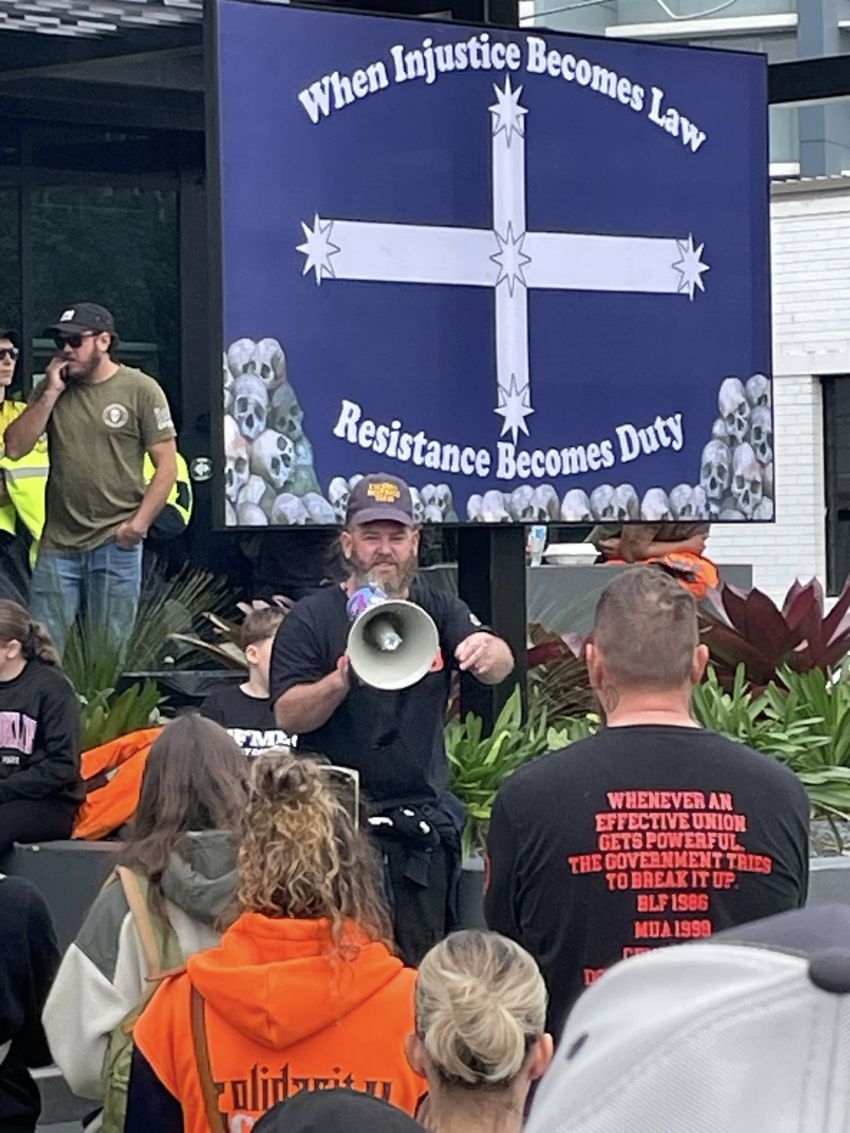
Thousands of construction workers from Magan-djin/Brisbane and the Gold Coast walked off the job and rallied on June 19 and 20 to defend militant unionism.
This followed a High Court decision that maintained federal Labor’s August 2024 imposition of external administration on the construction and general division of the Construction Forestry and Maritime Employees Union (CFMEU).
The case, which was brought by some elected, but now deposed, CFMEU officials, made an important argument that the High Court rejected. This was that construction workers have been denied their right to free political expression, through their association as union members who can chose their representatives.
Construction industry unions have been attacked via anti-union laws and other means for decades, but each attack has led to workers regrouping and, eventually, increased unity.
In recent years the CFMEU Construction Division has been able to organise to improve safety, pay and working conditions on job sites, particularly through the pattern bargaining of enterprise agreements.
The union supported the practice of applying pay deals won through enterprise bargaining with big construction firms to smaller companies. This means that workers doing the same job on a site all receive the same pay and conditions.
To ensure bosses stuck to the agreements, the union put in place well-trained shop stewards and health and safety representatives and serviced these workplace representatives with industrial organisers and elected officials.
The building industry is a dangerous and cut-throat place. While employers are making multibillion dollar profits, the CFMEU has made sure workers got a slice of the pie, by setting the pace on wages and conditions. As a result, the union had grown in recent years, winning great loyalty from members because it organised them to fight for their rights.
Labor’s attack on the CFMEU was not intended to abolish it altogether, but to leave the union rudderless and isolated. This means workers will die, such as the two workplace deaths in November at a Vestas wind farm because some bosses believe they might now get away with more recklessly flouting workplace safety procedures.
The media-generated allegations of corruption and intimidation associated with criminality that paved the way for the imposition of administration on the CFMEU remain unproven.
Instead, several elected CFMEU officials have been sacked without any corruption allegations against them and two NSW CFMEU officials have since pleaded guilty to corruption in the form of sweetheart deals with construction bosses.
Meanwhile, fines keep coming for CFMEU officials, as they have for years, for threatening and taking strike action.
What the bosses and their media call “intimidation” is workers fighting for their human rights and to uphold standards on the job.
While the Labor government wants to convert the CFMEU into a tame cat union that will put the hand brake on construction workers’ expectations, the pro-employer law firm Clayton Utz is warning that “workers who held strong relationships with the former leaders may seek representation elsewhere”.
Can any militant unionist still want to support the Anthony Albanese government?
With Labor in office for half of the last four decades or so, union membership has fallen as a proportion of the workforce from nearly 50% to about 12%. Tying our unions to Labor is not smart pragmatism, but a strategic dead end for which workers pay the price.
We need a fighting democratic union movement. This means members and delegates’ meetings directing industrial action and political campaigns, opposing state intervention and not subordinating union strategy to Labor’s pro-capitalist project. This will put the focus on workplace organising and popularising independent working-class politics.
As well, unions need a younger generation of workplace representatives and future union leaders.
The views and the voting trends of “Gen Z” and “Millennials” are well-established. A majority of young people support “socialism”, however they define it.
Many if not more are voting for the Greens or socialists than for Labor. They are where many of the union activists of today and tomorrow will be found.
The Queensland construction workers’ militant response to this bosses’ court ruling is something that needs to go nationwide. It’s the CFMEU’s tradition of struggle that can inspire all workers. This explains why the ruling class wants to break its power.
The ability of a worker to withdraw their labour is a basic human right, regardless of the laws against it. For us this is non-negotiable.
Socialist Alliance continues to oppose the government’s imposed administration on the CFMEU Construction Division and stands in solidarity with building workers.
[Jonathan Strauss is a Socialist Alliance National Executive member and labour historian who has decades of experience as a workplace representative, most recently as the NTEU James Cook University Branch President.]